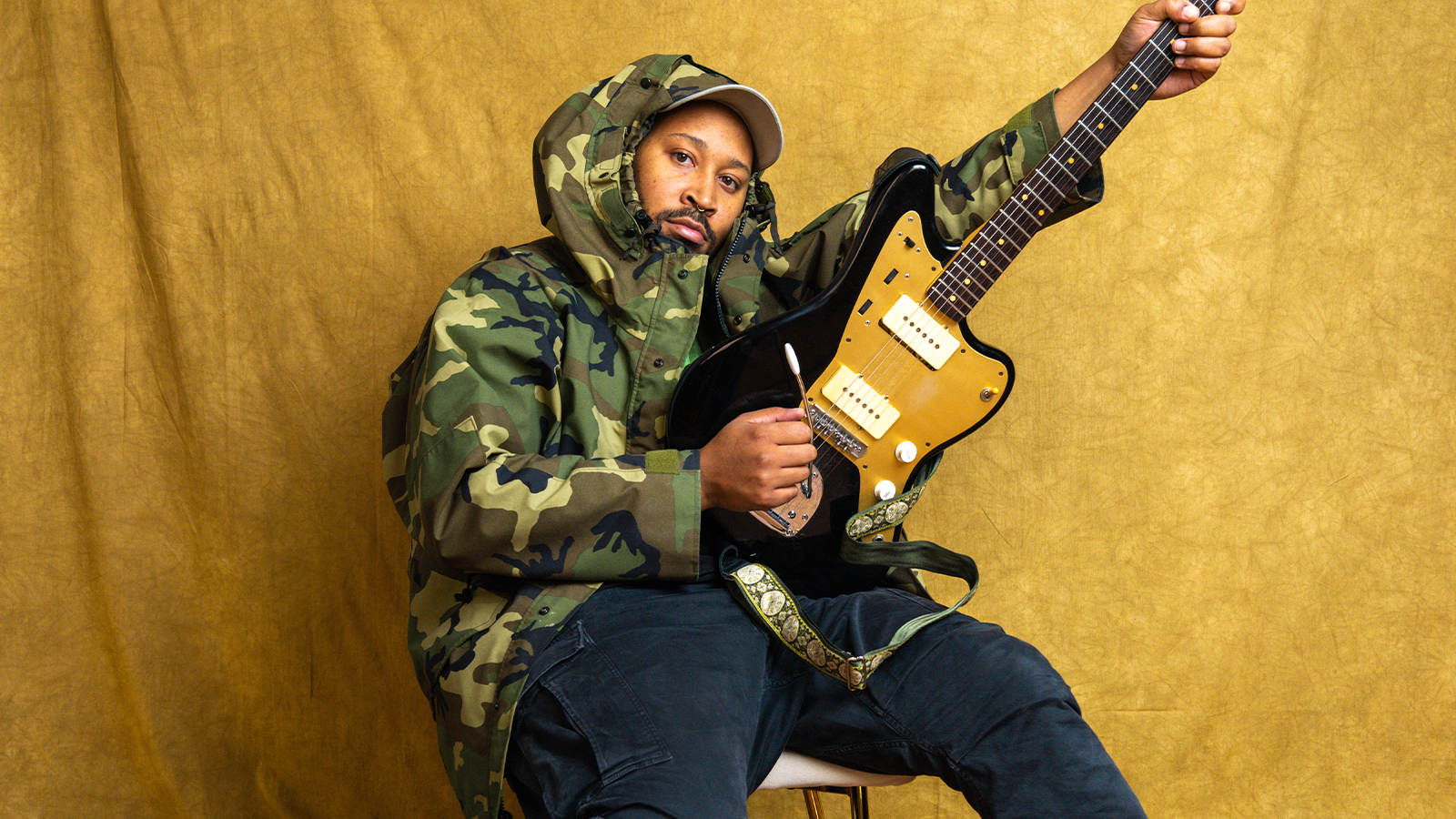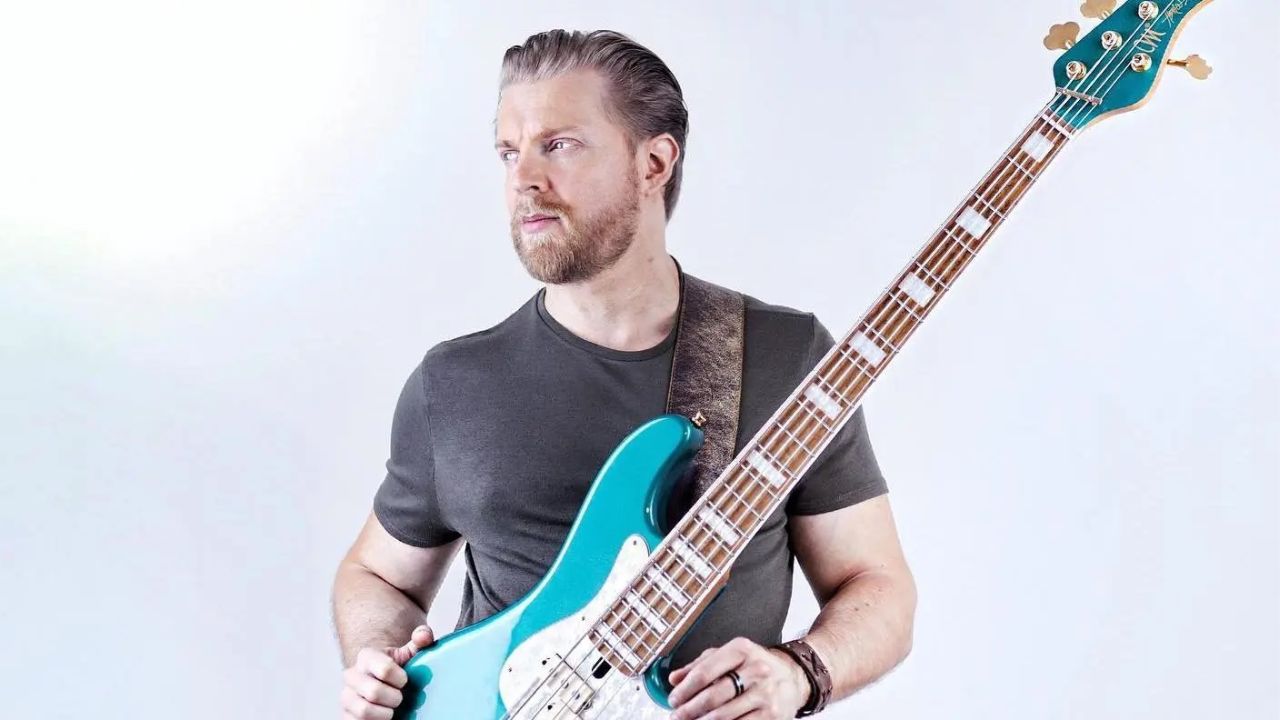Bartees Strange: “A lot of my songs tend to start off as country songs and become something else”
On the aptly titled Farm To Table, Bartees Strange celebrates family, formative experiences, and folk-rock

On his punchy and impactful full-length debut, 2020’s Live Forever, Bartees Strange (or Bartees Leon Cox Jr, if you’re being extra formal about it) invited listeners to experience the places that shaped him into the idiosyncratic powerhouse he is today – places like Mustang, Oklahoma, where he settled at age 12 after a childhood spent everywhere from Germany to Greenland; or Flagey, which is often seen as the cultural heartbeat of Brussels.
Live Forever set the scene for Strange’s story – so naturally, on its follow-up, we’re introduced to the characters that carry its narrative. At its core, Farm To Table is a family affair, Strange honouring his roots and those who planted them. It’s a homely record, which is reflected in a cruisier and less intense, yet much more dense and ambitious, soundscape. He taps deeper into his country influence, plays more in the pop realm, and is defiantly unafraid of dialling the energy down a notch.
With the album out and making waves just as big as its predecessor – if not bigger – Australian Guitar caught up with Strange to see learn how it came about.
I loved the intensity of Live Forever, but this record definitely feels a little more measured. Where did that mellower vibe come from?
Y’know, I just wanted more pacing. I wanted to show that I had grown a little bit as a musician, and that I could do some more things. I’ve gotten a little better at producing and recording records, so I wanted to kind of be a little more patient with the songs. I felt like with Live Forever, there was so much urgency – like I was trying to get people’s attention, y’know? And with this record, it’s like, “Okay, now that I have your attention, let’s just play some songs. Let’s slow it down and really feel the space.”
There are still those big moments, like ‘Cosigns’, ‘Heavy Heart’, ‘Wretched’ – I mean, ‘Wretched’ might be the biggest song I’ve ever made – but y’know, at the same time, ‘Black Gold’ is gorgeous. ‘Hold The Line’ is beautiful. ‘Escape This Circus’ is so dark and weird and twisty, and ‘Hennessy’ is super personal. It felt like there were so many other ways to connect [with listeners], and it was fun to explore that.
Would I be right in guessing that there was a bit more of like a blues or a folk influence on this one? That Nashville twang on ‘Escape This Circus’, that’s some god-tier shit.
Yeah. I mean, I grew up playing country music and I grew up in the country. And this record is largely about reflecting on my life, and the people who have meant so much to me in the places that have meant so much to me. A lot of my songs tend to start off as country songs and become something else. Like ‘Mustang’, off the first record, that’s a country song that just got hyped up and turned into this big rock thing. And with this record, like, ‘Escape This Circus’ has a shuffle underneath it, ‘Hold The Line’ is all big slide guitars, ‘Hennessy’ is this weird mix between a soul thing, a jazz thing and a folk thing... Y’know, I feel at home doing all of that, because as a guitar player, that stye was what really touched me first.
I’m interested in how your influences kind of crossover and blend in different ways. Like for example, how do you take your your hip-hop influence, and channel that into something you write on the guitar?
Well, I’m always kind of doing everything. When I was growing up, my mum and dad were really Christian, so I didn’t really listen to the radio much. But as I got older, and I had friends that were like driving cars and stuff, I got to hear the radio and hear what other people were listening to. And I was like, “Oh, this is sick, but it feels like Funkadelic, the stuff my dad plays.”
Get The Pick Newsletter
All the latest guitar news, interviews, lessons, reviews, deals and more, direct to your inbox!
I feel like I had a huge gap in my musical understanding, but because of that, I could notice references really clearly. Because all I had listened to was Christian music, gospel, classical music with my mum, and then my dad’s Parliament and Funkadelic records. So like, it was like P-funk blues, old country and gospel, and then I missed the ‘90s, and I missed like everything up until 2004. And then I was like, “Boom – you like Led Zeppelin? Okay, well I don’t know who that is, but they sound a lot like Eddie Hazel.” Or, “You like this Midwestern emo? Those guitar lines feel a lot like country music!” Those big Telecasters, capos, B-Benders – it’s all the same vibe, y’know? Everything kind of just blended together for me.
And I was really in love with recording. I had like a little four-track that I would record all types of little songs and ideas and loops into. I was always fascinated with how [different styles] were related to each other and where things came from, so when I started making music myself, it was just very natural for me to blend those things.
So when it comes to writing songs in all of these different styles, is the sound dictated by the headspace you’re in when an idea strikes you? do you have to be in a specific mood to write a trap-core banger, as opposed to a full on country ballad?
Yeah, I mean, they’re all vibes. Oftentimes I’ll just have a bunch of songs kind of swimming around in my head, and I’ll be like, “Oh, this one – I forgot about this one, let me just record this idea really quick.” And I’ll record it, and just let it sit for a while. And then eventually, I’ll pick a date in the future where I’m like, “I’m gonna revisit all these ideas, and see which ones connect with me the most.” That’s when I start kind of envisioning what a song can become. But it’s rare that I’ll just sit down and just finish a song. I don’t like putting too much pressure on myself.
You get a better sense of objectivity when you come back to an old idea with a new perspective. It helps those ideas to grow, right?
Yeah! It’s kind of modular – music is modular. And like you were asking, how do I start blending all these things? It’s like, it just starts with a country guitar line, and then I’m like, “Okay, what if we programmed some drums around it?” And then it’s like, “That sounds cool, let’s bounce that line out into my pedals – let’s start twisting some knobs and see what it turns into.” And then it’s like, “Okay, now let’s MIDI sync that to the click and run it backwards.” And all of a sudden it’s like, “Damn, that country guitar line is now a trap melody!” It’s just about giving yourself that time and patience, not being afraid to experiment, and just following the rabbithole.

Ellie Robinson is an Australian writer, editor and dog enthusiast with a keen ear for pop-rock and a keen tongue for actual Pop Rocks. Her bylines include music rag staples like NME, BLUNT, Mixdown and, of course, Australian Guitar (where she also serves as Editor-at-Large), but also less expected fare like TV Soap and Snowboarding Australia. Her go-to guitar is a Fender Player Tele, which, controversially, she only picked up after she'd joined the team at Australian Guitar. Before then, Ellie was a keyboardist – thankfully, the AG crew helped her see the light…
"They said, 'We don't have a direction yet, but you got the gig!' I said, 'Well, let me think about it'": Yngwie Malmsteen on why he turned down UFO
“I loved working with David Gilmour… but that was an uneasy collaboration”: Pete Townshend admits he’s not a natural collaborator – even with bandmates and fellow guitar heroes








![[from left] George Harrison with his Gretsch Country Gentleman, Norman Harris of Norman's Rare Guitars holds a gold-top Les Paul, John Fogerty with his legendary 1969 Rickenbacker](https://cdn.mos.cms.futurecdn.net/TuH3nuhn9etqjdn5sy4ntW.jpg)
